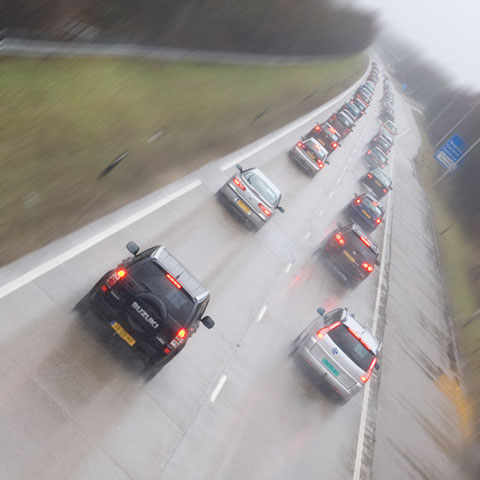Existing versions of intelligent cars could halve traffic congestion levels, the experts say, and prevent 25 percent of all accidents. So what’s holding them back?
“The car just stopped itself!” Top Gear’s Jeremy Clarkson cries out during a test drive of a luxury car fitted with radar-guided cruise control, which means it dynamically follows the car in front. “It speeds up, we speed up. It slows down, we slow down,” Clarkson explains, but adds that it’s eerily scary not to touch a brake pedal when coming to a roundabout at the end of the motorway. Still, the car performs flawlessly. “All right, I can go now. No need for me anymore,” Clarkson concluded.
Such driving intelligence exist, it doesn’t cost the world (between 1,000 and 3,000 euros), and, according to Professor Bart van Arem (CEGS), it makes driving safer, while also significantly reducing congestion if more than 10 percent of all cars are equipped with Advanced Driver Assistance Systems (Adas). So what’s holding back the dawn of mobile intelligence?
In her PhD research, Dr Leonie Walta (TPM), identifies four parties involved: the automotive industry, public authorities, insurance companies and car users. She had representatives of each group fill in questionnaires on various deployment scenarios, and then she used these data to evaluate the outcomes of a stochastical model that explored the different scenarios.
Walta concluded that the initiative for introducing adaptive cruise controls will most likely (about 70 percent) come from the car industry. If offered as an option, one in six drivers will opt for it, she found. If government were to support this driving assistant with a tax reduction of 1,500 euros, one out of every two drivers would buy the Adas option.
Such tax reductions may seem the logical course to take while also being a much cheaper way of reducing traffic jams than by road building. But as long as only the luxury car brands offer the option, governments would end up subsidising Mercedes and Lexus buyers, which doesn’t look too good politically, Prof. van Arem says. A breakthrough could come from a driving assistant (which can take over the dull congestion driving) being offered in ordinary car brands, but at present all the industry’s buzz is about electric cars.
Leonie Walta, Getting Adas on the road, 21 April 2011, PhD supervisors Professor Karel Brookhuis and Professor Bart van Arem.
Top Gear on adaptive cruise control:
bit.ly/fb2uW0
De steekproef werd uitgevoerd in opdracht van de Volkskrant. Vooral PVV-kiezers (74 procent) willen dat er minder geld gaat naar universiteiten en hogescholen. Bij GroenLinks is het juist andersom: 73 procent van de kiezers is tegen bezuinigingen op het hoger onderwijs.
Een meerderheid van de ondervraagden wil niet dat de basisbeurs wordt afgeschaft. Zestig procent stemt in met de stelling ‘ook al zijn bezuinigingen nodig, de studiefinanciering mag niet worden afgeschaft en vervangen door een sociaal leenstelsel’. Wordt de stelling anders geformuleerd (‘in het licht van de bezuinigingen is het een goed idee om de studiefinanciering af te schaffen en een sociaal leenstelsel in te voeren’), dan is dat nog maar 52 procent.



Comments are closed.